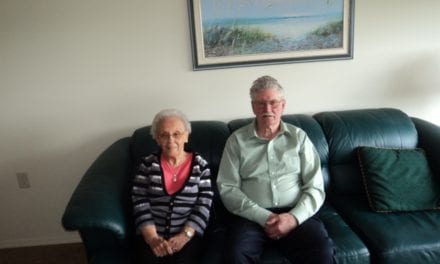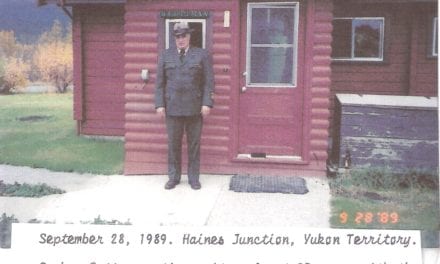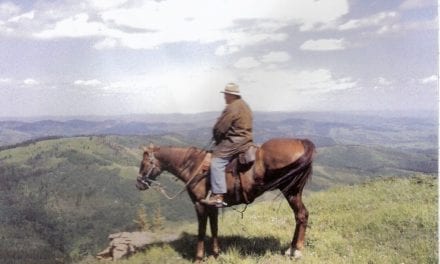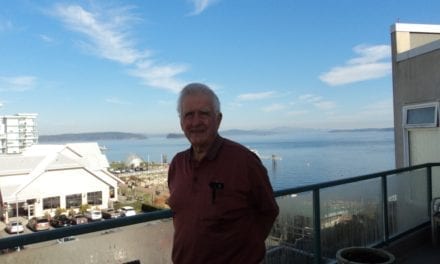(1:22:48) Duane – But I think with the warden service there was an attitude that they didn’t understand, but they created that in a way because the warden service in part was kind of Para military and there was a real esprit de corps that was created by training with public safety, fire and law enforcement. They all had a common theme there that you worked as a team, rank didn’t matter. If you were respected, you could be a long term seasonal, you could run a fire line and more long term guys that had less fire experience would be worker bees. It just worked with the wardens. You’d come together, even if you didn’t work with them a lot, you just came together and became a team and became supportive. Again if you didn’t get along with people or didn’t care for the science side, or the resource side, and they came under fire, the wardens would rise up and support them…I think for the longest time they always saw wardens as prima donnas and hard to get along with, demanding and that. I don’t think that they ever realized that they created that by the type of training and the job they had us do. So you stuck together, you just did that and if somebody pushed, you pushed back. The other employees wouldn’t do that. I think that was one of the neatest parts of the job was being able to do that. I travelled across Canada working with wardens who would do the same thing. You would step into a local organization where there was an investigation or something, like you could go to Newfoundland and it just came together…It was a real advantage to the wardens, the way that they were trained and organized. It really was a team.
(1:25:47) Donna – It is just like a family…
(1:25:33) Duane – I think again one of the things that was one of the biggest catalysts for that was like I said, from 1975 we were doing national law enforcement training and you are bringing wardens together from all across the country into a common training program. They would come back every five years and that bond just grew. It grew in other areas too, with public safety it was the same thing. You would go on a public safety training course, a rescue or something and that same cohesiveness, BOOM, it came together. But I think the law enforcement training overall was one of the biggest catalysts because then you felt it wasn’t even just your local family, it was a national family…In 1975, they changed the Palisades and created a national training center. They did other training, other law enforcement, but that was one of the first programs in there. They brought people from all across Canada and 20 years later you would run into guys again on law enforcement refresher courses that you taught or met 20 years ago. It brought that bond together that you are a family. And if you travelled across the country, you knew people. You could drop in on anybody
(1:27:26) Donna – I still think you could, even if you didn’t know them if you told them, “I am retired, but I was a park warden.” Again, you had something in common.
“Do you have any lasting memories from your time with the warden service? Like a favorite place”.
(1:27:47) Donna – Oh, many memories! I have many memories…I liked every place that we lived. And I especially loved Jasper…
(1:28:02) Duane – That was probably my favorite posting too…To do it again, I thought that the experience in Ottawa and Calgary would better prepare me for coming back into the field as a Chief Warden…because my peers were doing that…I went to Ottawa as a National Warden Service Coordinator so in my view I never technically left the warden service, I was a national representative, but I had so many people say, “Sorry to see you leave the warden service.” I hadn’t left the warden service, but in their mindset I had. I was going to Ottawa, there had never been a uniformed person down there…so it was like okay, “You are leaving.” I think that there was a sense that way, that I was outside the warden service. I did apply a couple of times to come back as a Chief Warden, but what it seemed the Superintendents were looking for was my peers who had stayed in the field and were Assistant Chief Wardens in a small park. They looked and this guy has been in Ottawa for four years. I think that it worked in my detriment. If I had one thing to do over I would have probably not gone to Ottawa and stayed in the field. Because every time I went to a park years later to work, it always tugged at the heart strings like, “Why the hell did I leave here?”
(1:29:43) Donna –But Rory Flanagan said when Duane was leaving, “Go to Ottawa, but don’t stay too long.” He didn’t really want to stay as long as he did.
(1:29:55) Duane – Like I said earlier, two years in and out, but when I got down there I realized there was a lot of work to do to set the position up. Two years wasn’t enough and then being that it was a bilingual position I had to go to language classes, so I was off the job for a year, 12 months, trying to learn French, which never really caught! It was a stressful 12 months to go through that. I was better off than a lot of people that I went to school with because their job depended on it. They had a job that was bilingual imperative; if they didn’t pass they didn’t have their job. Where with me if I didn’t pass I’d just apply to go back west. I knew that I was going there anyhow. So by the time you took a year to go to French class, I realized I am not going to accomplish anything in two years, so I have got to go four years. It turned out that it was six I guess.
“It is a huge range of experiences you’ve had…”
(1:31:01) Duane – I picked up on that a bit with the U.S. Parks Service, because we talked to them a lot. In their system to be a Superintendent or to be a Chief Ranger, required regional office time and/or Ottawa/Washington headquarters time. They saw that as a path for developing, rather than just staying in a park and promote locally which Chief Wardens could do here. They demanded that they leave the park and go and get those other experiences. So I thought…”That would probably make me stronger.” It didn’t work out that way, but the overall experience that I got was incredible too. To travel across the country, I wouldn’t have done that if I had stayed in Jasper and it gave me experience in training and education that I never would have got, but I did miss the field.
(1:31:50) Donna – Things turn out the way they are supposed to. And it was good for Darren to go to Ottawa… he is in Calgary. We have a granddaughter, her name is Tory.
(1:32:13) Duane – She is turning 12, 12 going on 20! So they are 30 minutes away from us.
Do you ever miss being a warden?”
(1:32:39) Duane – I do yeah. It is something that is sort of in your blood…You still feel there is a connection. If there is an issue or something you feel like, “Why didn’t they call me?” Or I should have gone. It’s just that feeling. I can remember when I first left in 1968 after our first stint at Saskatchewan Crossing. We came back to visit Monty Rose at Bow Summit…He was one of those characters as well…But anyhow they had a warden station at Bow Summit in those days and he was stationed there and we were at the Crossing. After I left, I came back to visit and I think a moose got hit on the highway so Monty got a call and he said, “I’ll be back.” I can remember that feeling for the longest time. I had been a warden up to even a short period of time, up to about three months before that and now he just left me and went out. I can still remember that feeling.
(1:33:51) Donna – Why didn’t you say (that you wanted to go too?)
(1:33:53) Duane – I should have I guess. It just caught me by surprise. I still felt that I was a warden and I should have gone. It was just there. So it’s faded over time, I feel less of that. But when you get together at warden days and talk to Hans and Lilo (Fuhrer) and some of the old timers, it sort of floods back. We talk still as if we are part of it. And the storytelling and stuff, you go back and relive some of that stuff.
(1:34:29) Donna – Remember when we were leaving, we had a party, a going away party and a lot of people from Banff came up to the Crossing. I think Monty went in and brought a keg of beer. And I made so much food, I remember cooking for two days!
(1:34:50) Duane – It was like family. The public safety training and stuff it was the same thing. It was just incredible times, a good bunch of people, fun…Except Peter Fuhrmann’s training. We always referred to them as a “Fuhrmann Sanction”. You see, Willi Pfisterer was just so steady. He never put you (in danger). He tested you, but never put you in jeopardy, or you never felt he did. Peter would just go and half the time you would end up in a real rescue with the guys on your team because he would tell you to go do things, or go climb something, or try this or that. You probably shouldn’t have and by the time you did it, it was like, “Man, are we ever lucky to get out of that.”
“I read about practice rescues… turning into real rescues.”
With Peter particularly, not so much with Willi.
(1:35:47) Donna – Willi would say, “Stand up! You won’t bump your head.” He was a really nice man.
“Donna do you ever miss the warden life?”
(1:36:05) Donna – At my age now no, but yeah I did The memories are wonderful.
(1:36:13) Duane – You seem to be quick to comment on stuff related to wardens!
(1:36:19) Donna – I still care about the warden service. It was such a big part of our lives, how could you not care about it…The memories are wonderful, but I wouldn’t want to go back now. I am too old for that now!
(1:36:38) Duane – One story that just jumped to mind is about training with your dad (Banff warden Keith Everts). We went into the Freshfields. We flew in there west of the Crossing, into the Freshfield glacier. It was another one of Peter’s big trips. We landed on a bench earlier in the day and Banff was responsible for groceries and all that kind of stuff. Oh, God, it was caviar and steaks! It was incredible…Banff always had more money. Banff would spend and at the end of the year Parks would bail them out. They just did that. That was just Banff you know! They were the park and they just did it. It was just incredible, the food and they put in about eight or nine bottles of 110 proof rum. We were probably at a 9000 foot camp. We had a really nice day, we flew in, in the morning and dug a bunch of snow caves, set up the kitchens, some tents and stuff. At about 3:00 in the afternoon we were just laid up on these rocks like iguana’s with a drink of rum. Well, by about 4:00 we’re just about 90% pissed! With the warm day and over proof rum somebody started a snowball fight and we just absolutely trashed the camp! So just as dark started we had to rebuild this whole camp so we could sleep that night…The next day we took off to climb a mountain. Peter’s sort of schedule…would pack about ten days of worth of climbing into two days of school sort of thing. You always knew that you were never going to do this, but to the powers that be it looked like, “Man, these guys are going out and they are doing five different climbs.” Half the time, we never got half of it done. But we climbed I think it was called Broad Peak. An easy slog to get up to, just mainly ski mountaineering. Your dad was leading the first rope and he kicked off a little slide on a side hill and down he went. The guy, I can’t remember who was tied onto him, he tried to do this self arrest thing. Your dad was sitting in a big chunk of snow, tobogganing down the mountain. This guy just put his ax in and went 20 feet in the air easily…and then he went tumbling down. The whole thing comes to a stop and Keith is sitting up to about his mid chest I guess in snow. He never lost his little cap, I remember he wore that short of English drivers cap with the ear flaps on it. He was sitting up right there and the other guy was partially buried…but you realized that you could see heads sticking out of the snow, so everybody kind of went, “Ten!” or “Nine!” We all rated the slide down the mountain. It was quite impressive to watch! We had to go down and dig Keith out. He sat down and rode it, sitting down all the way. But just again lucky with stuff like that. With all the training we did and the near misses…in formal training we never lost or seriously injured anybody, which was incredible. Those things come back and as stories they are funny, at the time it probably wasn’t. But many of those things, you just pee your pants talking about them again. At the time they weren’t funny, but after the fact they really were when you think about it…
“In your speech you talked about starting a partnership with (retired warden) Murray Hindle”.
(1:41:09) Duane – Yeah we did that for a couple of years. We had a couple of contracts with Federal Fisheries, rewriting all their law enforcement policies. So we consulted on that and reviewed all their law manuals…But after about two years of doing that Murray kind of drifted off on other stuff and I kind of lost interest in it as well. It was a nice little transition, it kept your hand in and used some of the stuff that was crammed in your head that you learned from Parks. Then I went and worked part-time for a funeral home in Calgary. A couple of days a week for two or three years and then I got tired of that. Then it was time to just finally put your feet up. It was kind of a nice transition. I would have had trouble if I had just stopped the office and sat with my feet up.
(1:42:09) Donna – You would still be working, I know you would. But he has been diagnosed with a heart problem.
(1:42:15) Duane – It is God’s way of telling me to slow down I guess.
“Are you able to manage your heart problem?”
Yes it is stable, but I don’t have a lot of energy and I can’t do a lot of physical stuff. I just have to adjust to what I can do.
Did you recently develop it?
Probably about two years ago. The heart over time just dies. It loses its ability to pump properly, so it gets weaker and weaker…It is stable at this time.
(1:42:58) Donna – The only thing they can do at this time is a heart transplant…Hopefully it doesn’t get that bad. I am sure it won’t.
(1:43:14) Duane – It just gives me an excuse to sit around the house and watch you do the honey do jobs!
(1:43:17) Donna – All these healthy wardens and you look at it and say, “What happened?” After they retire…and they lived such healthy lifestyles. That is what I don’t get.
(1:43:38) Duane – Maybe 70% of the wardens that I’ve talked to, the older wardens everybody has had hips or knees done. The skiing, climbing and riding was really hard on that…
(1:43:54) Donna – Then you get people like Al Stendie, he certainly wasn’t overweight and he had a heart attack…
(1:44:04) Duane – You are not going to get out of life alive!
(1:44:05) Donna – You are not, but you always think that your lifestyle was so much healthier than so many people.
(1:44:12) Duane – A guy like Willi Pfisterer, he was so active, but just his metabolism and his heart rate, his resting heart rate was something scary…it was like 30 or something…He was in incredible shape, but he didn’t get out of life alive either. As you get older your body kind of falls apart on you.
Donna Martin passed away on May 4th, 2014.



